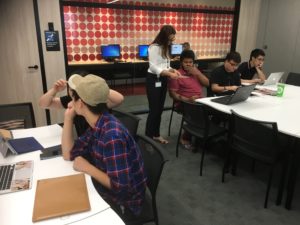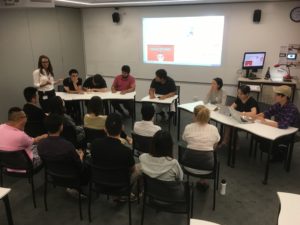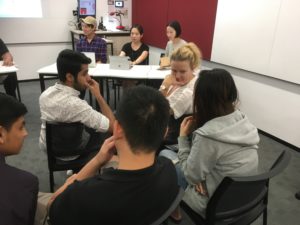‘It’s affirmative’: Student debates are a great alternative to presentations

You are probably familiar with the phrase ‘death by PowerPoint’. It encapsulates that universal human experience of feeling one’s eyes glaze over as a presenter reads every tiny line of text verbatim from a slide deck pushed to the absolute limits of its margins.
Before our curriculum review in 2015, students used to write several assignments as part of their writing course. They also conducted a presentation, which they often dealt with in the same manner they prepared their assignments – they wrote lengthy paragraphs on slides and they read them out. They sometimes simply copied and pasted sections from their assignments onto their slides and it was tackled as “another thing to do” to get through this course.
They not only disliked the task, but some of them did not properly meet the outcomes of the COMM101 Writing and Research Diploma Unit.
Creating a lively debate to better assess learning
By replacing that with a debate, students seem to get more engaged and motivated because they are asked to defend a position and try to win the argument. This competitive element triggers more interest in the task, and students really try their best to support their argument with solid research and evidence, while also presenting it convincingly.
They also have to listen to the opposing team as they have to present a rebuttal, and students in the audience have to listen attentively as well, because at the end they are asked to vote for their preferred team.
The learning is generally sequenced like this:
- In the lead-up to the debate, students conduct critical analysis of sources, practice referencing, and review ways of taking a position and supporting arguments, as well as other language-based tasks such as nominalisation and integration of academic voices. This may include giving students some generic debate phrases to introduce or conclude their points.
- Around week 7, students are given a controversial statement related to an Arts/Communication topic and in small groups they build arguments supporting the side of their team (affirmative or negative).

- After submitting their arguments (supported with research/ examples/ statistical data/ referencing) they present their arguments in a debate in class, moving between the affirmative and negative team and followed by a rebuttal.

- At the end, students in the audience are asked to discuss the debate and vote for their preferred team.

Outcomes
Students seem to really enjoy this task, because it gives them an opportunity to truly analyse one side of an argument (while trying to predict what the opposing team will say). They also conduct research and assess sources, present their position formally and academically, and really put into practice all the academic skills learned throughout the course, without actually having to write another assignment.
Feedback on the unit indicates students are really enjoying the debates, for example:
“I think this is an interesting subject but also challenging for me. I reckon this subject has built up my writing skills… also the debate is one of the most exciting parts in this course. I really enjoyed this subject!” [YF]
“I found it was quite interesting in the class, work load is fine and class activities are effective to assist me to learn, such as debate and field trip, better than only sitting in the classroom.” [OC]
Potential pitfalls
Shy students do need to work a bit harder at this task, since they have to build their confidence when speaking in front of an audience, without relying on presentation slides behind them.
They can be advised to practice at home and film themselves with their smartphones/ tablets to review their body language, pronunciation, the pace they are speaking at and so on.
Keep reminding students that: “practice makes perfect”!
Footage from the classroom
Hear Karen describe the process in her own words in the short video below, where you can also catch some classroom scenes from a previous, lively debate!
For more information, contact Karen.McRae@sibt.nsw.edu.au or continue the conversation on Yammer.
